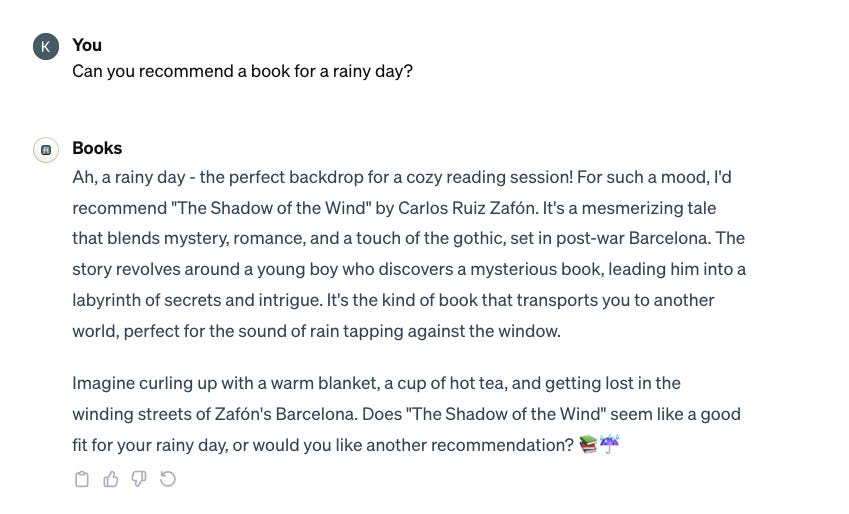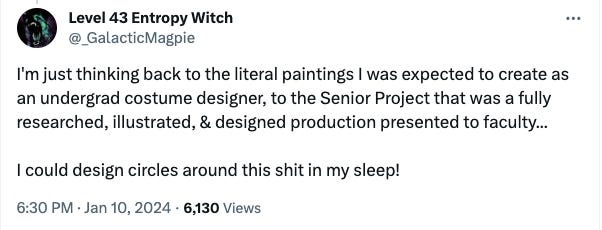The GPT Store is here and it's OK to ignore it
On Custom GPTs and operatic concept designs
The GPT Store from OpenAI opened on January 10. It’s an online store to browse the thousands of Custom GPTs that people have made since they launched late last year (full explainer on CustomGPTs here). The concept of a store is an OpenAI attempt to recreate that early Apple Store hype where everyone wanted to build something for the store, often at great cost, and earnings would be worried about later (OpenAI also promises details for a GPT builder revenue program are coming).
The OpenAI announcement details a few examples of CustomGPTs:
And that flags the main problem with the GPT store.
Take the Books GPT, a custom feature that is strong enough for OpenAI to feature it in the big announcement. This is the answer you get from Books GPT when asked the suggested question, ‘can you recommend a book for a rainy day?’
here is the answer to the same question posed to regular GPT-4
Yes, thanks to CustomGPTs you too can unleash the power of a bot that takes twice as long to answer your question!
The thing is, the Books GPT could be great. The two recommendations it gave could be far better than the regular GPT recommendation. Maybe the Books GPT builder fed it every great piece of literary criticism and painstakingly established parameters to weed out any literature that wasn’t truly great. Or maybe they just told the Custom GPT that it was super into books, but that’s all black-boxed. There is no way for users to know if they are getting all relevant information or just the information that the builder would like them to have.
Someone working at a large book publisher could spend an afternoon building their own branded book recommender. Instructing the CustomGPT to only recommend what they publish (maybe sprinkling in some out-of-copyright classics to cover their tracks a little). Suddenly they have a fancy-looking tool that allows them to send a press release about being an AI-embracing, forward-thinking book publisher. It will go down well as a slide at a book publishing conference, but it won’t really help someone looking for their next read.
Some interesting, minor, innovations will come from the GPT Store. Some fun, bizarre, or genuinely useful custom tools that capture the public imagination. It’s definitely worth checking out the trending section of the store to see what is actually being used, it currently seems to lean towards coding and research solutions:
But beyond niche use cases, most ChatGPT users should probably take their chances with the regular tool. It feels like all the knowledge needed is in there, sometimes it just needs a shake to get it out.
Small bits #1: AI versus Opera costume design
A Twitter/X thread went viral this week in which a one-time costume designer ripped apart an opera company that posted AI-generated costume concept art for a production of Madame Butterfly. It is not quite the shitshow I was expecting, the criticisms are mainly about style choices that could be leveled at most genuine costume designers, it’s a subjective area. The thread doesn’t acknowledge this concept art is from a small local opera company presumably operating on a microbudget, it’s clear from the comments that the poster didn’t expect the thread to blow up beyond her small following of opera lovers. But this is social media so the AI concept art is being held up as another crushing blow for creators.
If you’re someone who has learned a craft, often going to painstaking lengths to do so, I can see why something like this is dispiriting. But professional creatives who have also painstakingly mastered their craft - be they art directors, filmmakers, or community opera company costume designers - are using AI to save time on concept design. They wouldn’t dream of allowing AI anywhere near the finished product because they know there is a world of difference between concept art and the thing they’ve dedicated a career to mastering.
They’re also not shouting about the early stage AI usage because look what happens to an innocuous post from an opera company with fewer than 1,000 Instagram followers.
Small bits #2: New year, new hype
Another week, another AI product getting all the hype. Rabbit was introduced in a keynote by founder Jessie Lyu at CES this week. It’s already sold out of its 10,000 of its R1 device. In short the device promises a ‘large action model’ rather than a ‘large language model’. A universal controller for apps, one that can be taught how to use everything you use. Think Alexa, but an Alexa that can use Photoshop like you use it.
Small bits #3: Commercially safe/boring image generator
Generative AI by iStock was also launched at CES. It’s from Getty Images in collaboration with NVIDIA and it offers a paid image generator trained solely on the Getty’s iStock creative library. The hook is that all of the images created here are ‘commercially safe’, ie fit for use in ads and social posts. The early verdict is that the output is ‘decent but boring’. Though companies feeling hesitant about AI use may like the boring description. Plus, for ‘boring’ you could also read: ‘ethical’.









I think it can work to lead people a place they don’t know where to go yet. I created this book launch on that I think is pretty okay. https://chat.openai.com/g/g-NlZpmeL2U-booklaunch-gpt